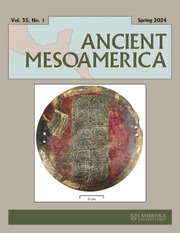Article contents
Urbanism, Militarism, and Architectural Design: An Analysis of Epidassic sociopolitical structure at Xochicalco
Published online by Cambridge University Press: 09 November 2010
Abstract
The form and organization of urban architecture is examined at the central Mexico site of Xochicalco to reconstruct aspects of both its internal community structure and regional political organization during the Epiclassic period (A.D. 700-900). Analysis of the site's defensive architecture provides unique information about the city's internal design. Dry moats, walled roads, and steep terrace facades subdivide the community into a series of population segments that on the basis of both size and architecture type resemble ward divisions found in central Mexico cities at the time of Conquest. Furthermore, Xochicalco does not have a single defensive perimeter characteristic of a strongly centralized polity; instead, it possesses a series of defensive precincts located on the hills and ridges adjacent to Cerro Xochicalco that are equivalent in form and redundant in function. The model that best approximates the segmentary nature of this structure is that of a regional confederacy dominated by Xochicalco during the Epiclassic.
Resumen
Este estudio presenta un resumen del diseño y la organizatión arquitectónica en la ciudad de Xochicalco, Morelos, en el altiplano central de México durante el epiclásico (700-900 d.C). El propósito de este análisis es la identificatión de la estructura social interna de la comumdad urbana y el papel que tenía en el sistema política en el occidente de Morelos. El estudio se basa en un análisis arquitectónico, el cual proporciona datos muy informativos sobre el plan defensivo y su impacto sobre el diseño urbano. El sitio está dividido por fosos defensivos, calzadas amurralladas y las fachadas de terrazas grandes en una serie de unidades las cuales, por medio del tamaño de su población y el tipo de arquitectura ceremonial, representan un nivel de organizatión parecido a los barrios reportados en las ciudades del altiplano en el momento de la Conquista. También en Xochicalco se encuentran conjuntos múltiples e independientes que fueron construidos con sus defensas propias. Esto es interesante porque suguiere que el sistema politico está caracterizado por una organizatión segmentaria y no centralizada. Es muy posible que la organizatión política que produjo este patrón arquitectónico fuera una confederatión de comunidades bajo el dominio de Xochicalco durante el epiclásico.
- Type
- Articles
- Information
- Copyright
- Copyright © Cambridge University Press 1995
References
- 12
- Cited by


